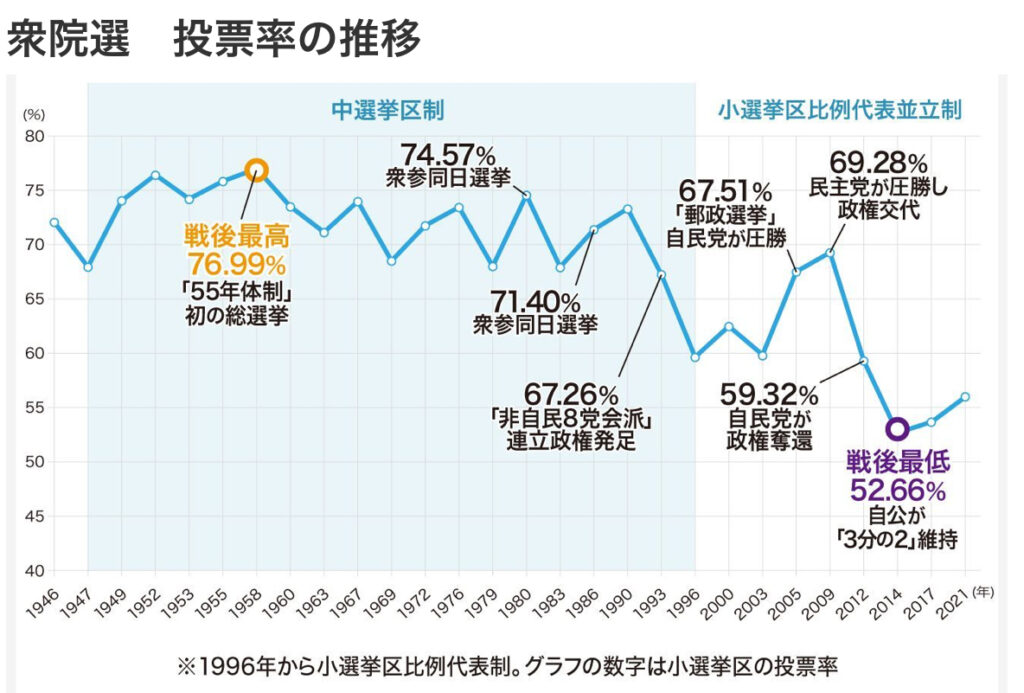
1票は「牛丼1杯分」の価値 衆院選
✍️記事要約
651億円――。前回2021年衆院選にかかった費用だ。投開票所の運営▽候補者ポスターの掲示板設置と撤去▽投票用紙や選挙公報の印刷――などに充てられた。これらの準備や執行は各自治体が担い、かかった費用は選挙後に国から交付される。
「政治とカネ」の問題が選挙の争点となる中、私たちの税金で賄われる国費がこれだけ投入されている。民主主義のコストは高いのか、安いのか。
◼️物価高騰で費用上積み 職員は「総動員」
230万人都市の名古屋市では、今月11日の定例市議会で衆院選に伴う費用5億9590万円の一般会計補正予算案が追加上程され、可決された。衆院選の経費はこれまで約5億5000万円だったが、今回は物価高騰の影響もあり、少し上積みされている。
市選挙管理委員会によると、市内2724カ所のポスター掲示板の設置・撤去費に4000万~5000万円かかるが、投開票所や期日前投票所の管理人、職員の配置など人件費が中心になるという。担当者はやや疲れた表情で「期日前投票から投開票日まで職員は総動員です」と話す。
税金が投入される以上、自治体側は経費節約が求められる。ポスター掲示板は再生利用できる材質のものを採用し、次の国政選挙などに活用するが、掲示板自体を減らすことはできないのだろうか。
愛知学院大の森正教授(政治学)は「掲示板や選挙公報は、有権者が自ら情報を取りに行くネットとは違い、日常生活の中で自然に情報を得ることができ、重要な役割を果たしている」と強調。それでも「有権者への情報提供の方法など、信頼性を維持した形で見直す時期には来ている」と指摘する。
◼️衆院選の直後に市長選 費用は同じ6億円
名古屋市では前市長が衆院選に出馬したことに伴い、衆院選投開票日の27日から1カ月足らずで市長選が実施される(11月10日告示、同24日投開票)。市選管によると、市長選でも衆院選と同じ約6億円の費用がかかる。
国政選挙とは違い、自治体の選挙はその自治体が費用を負担。仮に衆院選と同日選だった場合、市内363カ所の投票所の開設が一度で済むことから、それぞれ単独で選挙を実施した場合の計約12億円から9億円まで圧縮できるという。
◼️ 衆院選、1票の価値は「牛丼1杯分」
若者の政治離れなど投票率の低下が指摘される中、名古屋市選管は今年2月、障害や病気などの理由で支援を必要とする人が投票しやすい環境を整えようと、全国の自治体でも進む「投票支援カード」を導入した。カードに「筆談」「車いす介助」など支援事項を記入してもらう。また、弱視の人にも投票用紙を見やすくするケースも作製した。担当者は「選挙は税金で成り立っているので、多くの人に投票してもらいたい。『(投票に)行っても変わらない』ではなく、『行けば変わる』という意識を有権者に持たせる広報活動を展開していきたい」と話す。
人、金、知恵を使った自治体の努力も投票率が上がらなければ無駄になってしまう。有権者が自分たちの生活、国の形に意思を表明する衆院選の1票はどれくらいの金額なのか。
前回衆院選の費用約651億円を全国の選挙人名簿登録者数(21年9月)の約1億551万人で割ると、有権者1人当たり約617円となる。名古屋大の山本竜大教授(政治コミュニケーション論)は「(衆院選では)およそ牛丼1杯分の金額で達成される民主主義を高いと思うか、安いと思うか、それぞれの判断だが、私たちは投票する権利を税金で賄っていることを考えると選挙に対する価値観と制度、その運営の意味を考えてみてもいいでしょう」と話す。
■英訳
65.1 billion yen—that was the cost of the previous House of Representatives election in 2021. This budget covered the operation of polling stations, the installation and removal of candidate poster boards, the printing of ballots, and election newsletters, among other things. These preparations and operations are managed by local governments, and the expenses are reimbursed by the national government after the election.
As the issue of “money and politics” becomes a campaign point, a significant amount of taxpayer money is being spent. Is the cost of democracy high or low?
■ Increased Costs Due to Inflation, Staff at Full Capacity
In Nagoya, a city of 2.3 million people, an additional general account budget of 595.9 million yen for the House of Representatives election was submitted and approved in a regular city council meeting on the 11th of this month. The previous election cost around 550 million yen, but due to inflation, there has been a slight increase. According to the city’s election management committee, 40 to 50 million yen will be spent on the installation and removal of 2,724 poster boards within the city, but the majority of the costs will go towards personnel expenses, including managers and staff at polling stations and early voting locations. One official, looking slightly fatigued, said, “All staff will be mobilized from early voting through election day.”
Since taxpayer money is being used, local governments are required to minimize expenses. For example, the poster boards are made of recyclable materials and can be reused in future national elections. However, reducing the number of boards themselves is not feasible. Professor Masashi Mori of Aichi Gakuin University, a political science expert, emphasized the importance of these boards and election newsletters, stating, “Unlike the internet, where voters actively seek information, these provide passive access to information in daily life, playing an important role.” However, he also pointed out, “It may be time to review the methods of providing information to voters while maintaining trustworthiness.”
■ Mayoral Election to Follow the House Election, Costing Another 600 Million Yen
Due to the previous mayor’s candidacy for the House of Representatives, Nagoya will hold a mayoral election less than a month after the House election (notice on November 10, voting on November 24). According to the city’s election management committee, the mayoral election will cost approximately 600 million yen, the same as the House election. Unlike national elections, municipal elections are funded by the municipality itself. If both elections were held on the same day, the total cost could have been reduced from about 1.2 billion yen to 900 million yen, as the 363 polling stations in the city would only need to be set up once.
■ The Value of a Single Vote in a House Election: Equivalent to a Bowl of Beef Rice
Amid concerns over declining voter turnout and political disengagement among young people, Nagoya’s election committee introduced a “voting support card” this February to make voting easier for those who need assistance due to disabilities or illnesses, a system being implemented in other municipalities as well. Voters can write down the type of assistance they need, such as “written communication” or “wheelchair assistance,” on the card. Additionally, they have created cases to make the ballots easier to see for those with impaired vision. An official commented, “Elections are funded by taxes, so we want as many people as possible to vote. We aim to promote the message that ‘voting will lead to change,’ rather than the sentiment that ‘nothing will change even if you vote.’”
Without higher voter turnout, all the efforts and resources from local governments would be in vain. How much does a single vote in a House election actually cost? If the approximately 65.1 billion yen spent on the previous House of Representatives election is divided by the roughly 105 million registered voters (as of September 2021), it amounts to about 617 yen per voter. Professor Tatsuhiro Yamamoto of Nagoya University, an expert in political communication, remarked, “Whether you think that 617 yen, about the cost of a bowl of beef rice, is too high or too low for democracy is up to each individual. However, it’s worth reflecting on the value of elections, the system, and the significance of its operation, considering that our voting rights are funded by taxes.”
◇ ◇ ◇
☘️ヤフコメ❗️ピックアップ☘️
むしろ、617円という価値に換算するのではなく、投票することが出来なかった場合を想定させた方が良い場合もあるのではないか。
問題があると考えたときに、声を上げる機会がないとすれば、すべてに対して泣き寝入りを行うこととなる。そうした制度が望ましいと考えるのか、それとも声を上げる機会を与えられるとすれば意味のあることと考えることも出来るのではないだろうか。
そうした投票という「プライスレスな価値」に気づく機会も必要だ。
✅ 投票1件に600円掛かっているというだけでも価値がありますが
一票の価値はその後も政党交付金(年140円)として支援したい
政党へ力を発揮し続けることになります。
例えば「政策としては賛同しているものの弱小な政党」がいるとして、
どうせ落選するだろう、与党にはなれない、と考えていたとしても
その一票がずっと支援をし続けることになり、次の力になります。
無投票は権利を放棄する悲しい行為です。
病気などで投票に出向けない人もいる中で、期日前投票など様々な
手段があり投票できる人は是非投票に行きましょう。
投票者が政治を意識するだけでも価値があることです。
無駄な投票はありません。
どの政党に投票するかはそれぞれの考え次第だと思いますが、
投票に行ける方は、絶対に投票に行くべきです。
✅ 前回衆院選にかかった費用が651億円で投開票所の運営、候補者ポスター掲示、投票用紙などにかかるとの事である。国民の血税が約650億円も使われているわけだが、折角マイナカード普及を進めているなら、マイナカードと連動させて投票・開票出来るシステムも考える余地はある。当然セキュリティーや設備開発にかかる経費の問題はあるが、今の情報化時代にあったシステムに改良していく必要はあると思う。
![]()
